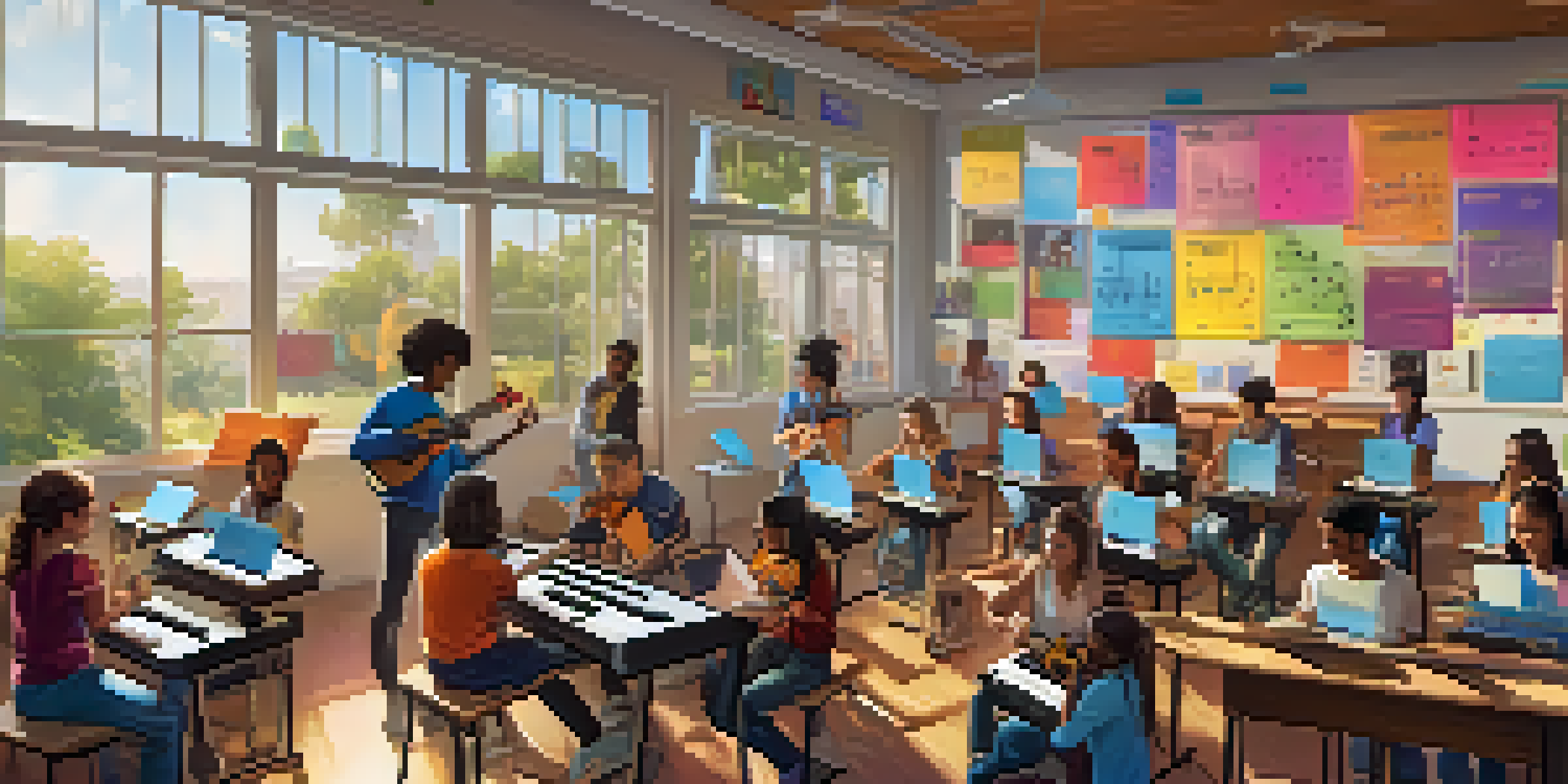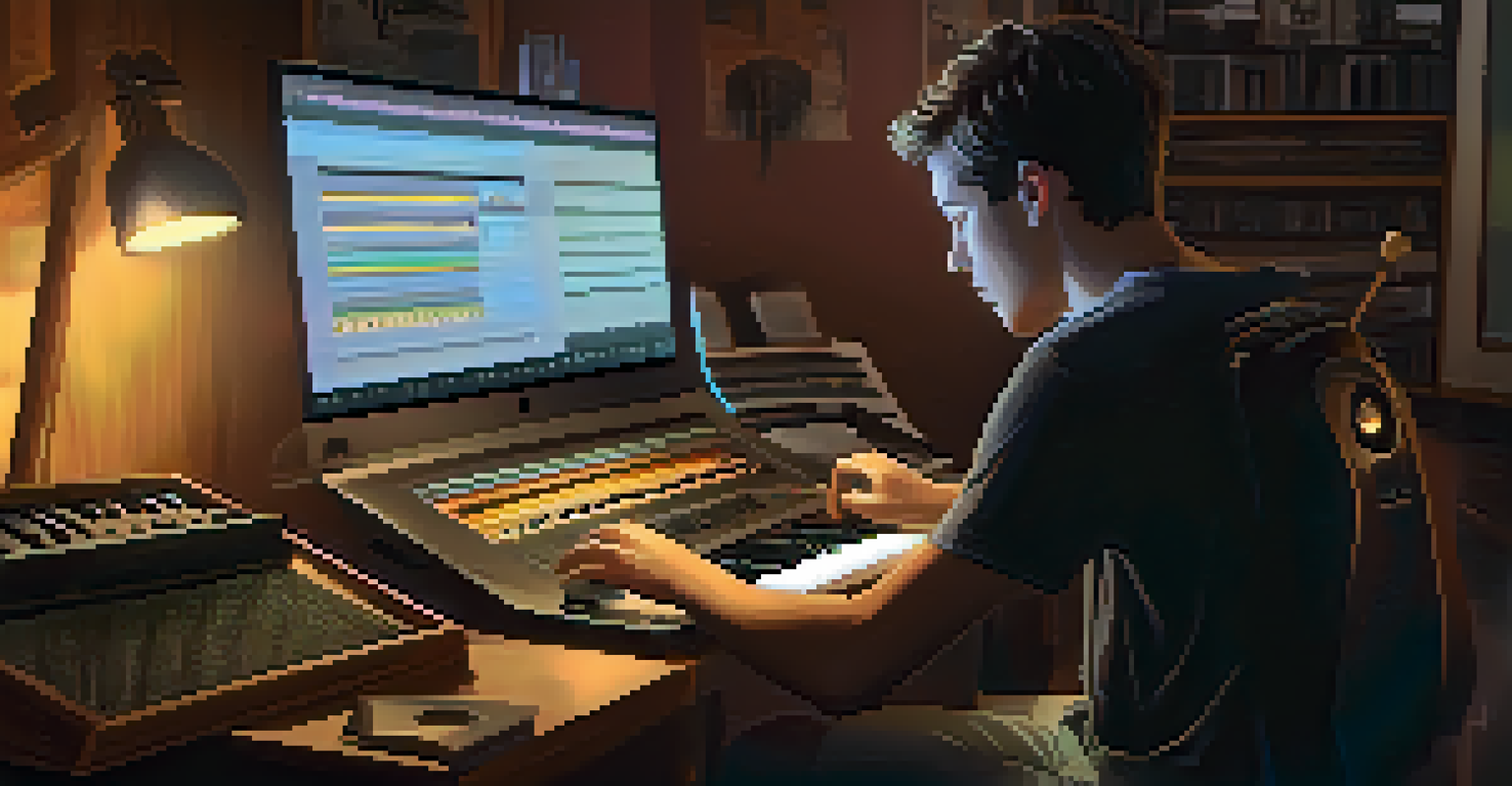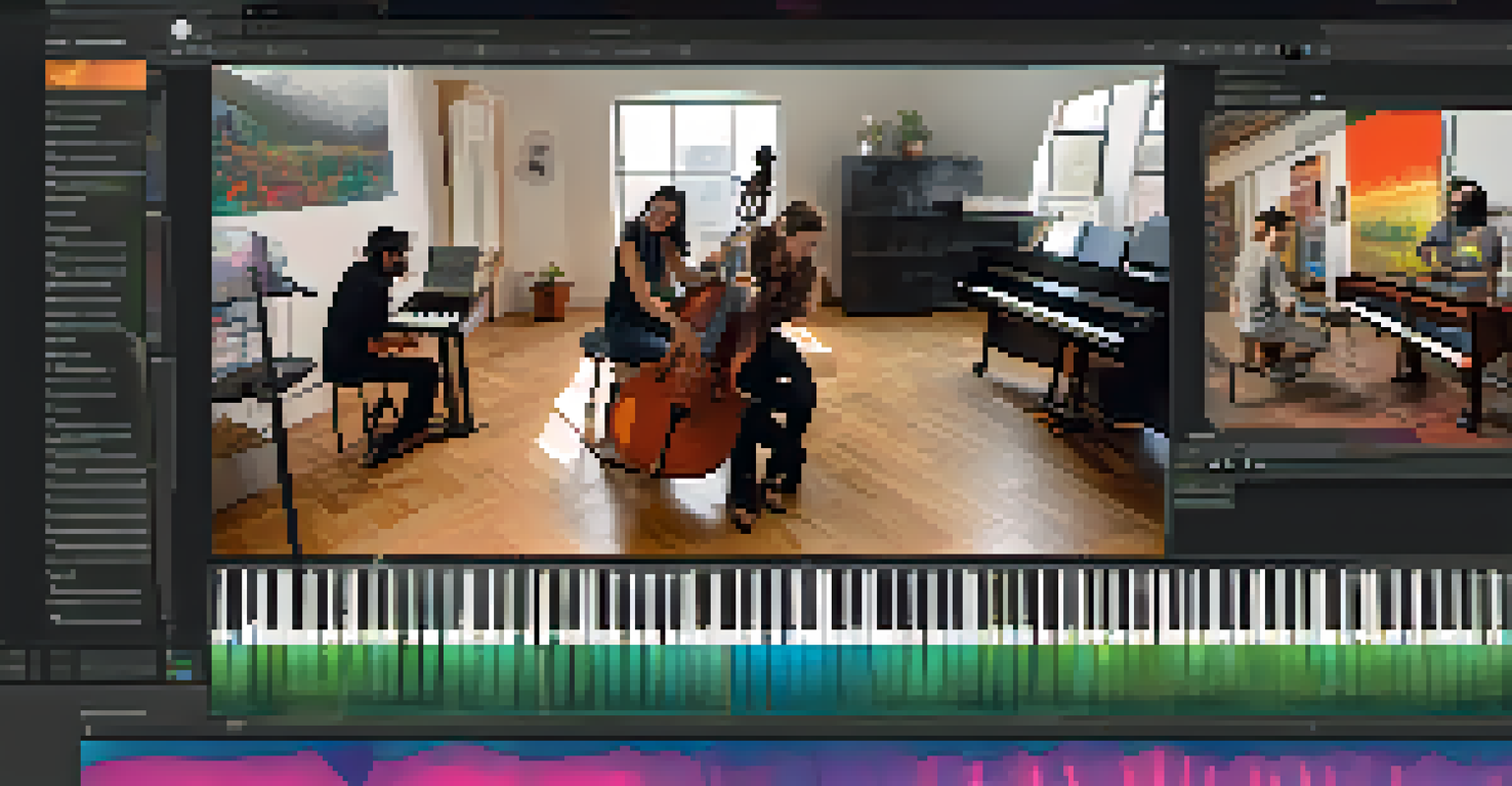The Future of Music Education: Integrating Emerging Technologies

The Evolution of Music Education in the Digital Age
Music education has undergone significant changes over the years, especially with the rise of digital technology. Gone are the days when students only learned from traditional sheet music and in-person lessons. Today, platforms like YouTube, online courses, and music apps provide access to a wealth of resources that empower learners to explore at their own pace.
Music education is not just about learning notes; it's about developing the whole person through creativity and expression.
This evolution means that music educators are now tasked with incorporating these technologies into their teaching methods. They must find ways to blend traditional techniques with modern tools to create a more engaging learning experience. For instance, using software like GarageBand or Sibelius can help students not only learn music theory but also apply it in real-time, making the learning process more interactive.
As we move forward, understanding this blend of old and new is crucial. Music educators who embrace these changes will not only enhance their teaching but also prepare students for a world where technology and music coexist harmoniously.
How Artificial Intelligence is Shaping Music Learning
Artificial Intelligence (AI) is making waves in various fields, and music education is no exception. AI tools can analyze a student's playing style and provide personalized feedback, which can be invaluable for improvement. For instance, programs like SmartMusic offer real-time assessments, allowing students to understand their strengths and weaknesses instantly.

Moreover, AI can assist in composition as well. Applications like Amper Music enable students to create original pieces by simply inputting their preferences. This kind of technology not only sparks creativity but also allows students to experiment with music composition without needing extensive training.
Digital Tools Enhance Music Learning
The integration of digital platforms and apps allows students to learn music at their own pace, making education more accessible and engaging.
The integration of AI into music education presents both opportunities and challenges. While it can enhance learning experiences, educators must be cautious about balancing technology with personal mentorship to ensure students receive comprehensive education.
Virtual Reality: A New Dimension in Music Education
Virtual Reality (VR) is an exciting frontier that is beginning to influence music education in profound ways. Imagine stepping into a virtual classroom where you can interact with instruments and learn from renowned musicians from the comfort of your home. This immersive experience can make learning more dynamic and engaging.
Technology is best when it brings people together.
Programs like Oculus Venues are paving the way for virtual concerts and masterclasses, allowing students to experience live performances in a completely new format. They can watch, listen, and even interact with performers, creating a sense of community that transcends geographical barriers.
As VR continues to evolve, it holds the potential to revolutionize how we perceive music education. The ability to simulate real-world experiences can enhance students' understanding of music theory and performance, making learning both fun and impactful.
The Role of Mobile Apps in Music Learning
Mobile apps have transformed how students learn music, offering unprecedented flexibility and accessibility. Apps like Yousician and Simply Piano allow users to learn at their own pace, offering tutorials, exercises, and instant feedback right from their devices. This convenience is especially appealing to younger generations who are accustomed to learning through their smartphones.
These apps often gamify the learning experience, making practice more enjoyable and less daunting. With features like progress tracking and challenges, students are motivated to keep improving their skills. It's like turning practice into a fun game rather than a chore.
AI Personalizes Music Education
Artificial Intelligence provides tailored feedback and assists in music composition, helping students improve and innovate in their learning.
However, while these apps are beneficial, they should complement, not replace, traditional learning methods. Teachers can guide students in using these tools effectively, ensuring they gain a well-rounded education in music.
Collaborative Learning in the Digital Space
Collaboration has always been a cornerstone of music education, and emerging technologies are enhancing this aspect like never before. Online platforms allow students from different parts of the world to collaborate on projects, share ideas, and learn from one another. Tools like Soundtrap enable musicians to create and record music together in real-time, regardless of their location.
This collaborative environment fosters creativity and innovation. Students can gain insights from diverse musical backgrounds and cultures, broadening their understanding of music. It’s a fantastic way to build connections and learn teamwork skills, essential for any musician.
As we embrace this digital collaborative trend, educators must find ways to integrate these experiences into their curricula. This approach not only enriches the learning process but also prepares students for a global music industry.
Blending Traditional Techniques with Modern Tools
While technology continues to reshape music education, the importance of traditional techniques cannot be overlooked. Skills such as ear training and sight-reading remain fundamental to a musician's development. Educators must find ways to blend these classic approaches with modern tools to create a holistic learning experience.
For example, using apps that provide instant feedback can enhance ear training exercises. Students can practice identifying notes or chords while receiving real-time guidance, making the process more effective and engaging. This combination of old and new ensures that students develop a well-rounded skill set.
Collaboration Transforms Music Classes
Online platforms enable global collaboration among students, fostering creativity and teamwork essential for modern musicians.
Ultimately, striking the right balance between tradition and innovation is key. Music educators must adapt their teaching methods to include both elements, ensuring that students are well-prepared for the future.
The Importance of Lifelong Learning in Music
In an ever-evolving digital landscape, the concept of lifelong learning has become essential in music education. With new technologies emerging regularly, musicians must stay current with trends and tools to remain competitive. This mindset encourages students to view learning as a continuous journey rather than a destination.
Online resources, workshops, and masterclasses provide musicians with opportunities to refine their skills and explore new genres or techniques. Platforms like Coursera and MasterClass offer courses taught by industry professionals, allowing students to learn from the best in the field.

Encouraging a culture of lifelong learning not only benefits individual musicians but also enriches the music community as a whole. As musicians continue to grow and adapt, they contribute to a vibrant and diverse musical landscape.